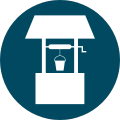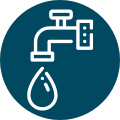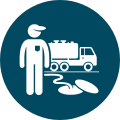
Our vision:
A safe and healthy Kitsap County for all.
Certification for Septic Professionals
Drinking Water & Onsite Sewage
What You Need to Know About Properties Connected to a Septic System
A septic system is a critical part of a home. It collects, treats, and disposes of all water from toilets, sinks, tubs, showers, dishwashers, and other appliances.
Before buying or selling a home connected to a septic tank, make sure that you know the status of the septic system. Kitsap Public Health District can review records, inspect the system, and provide you with a written report of what we find. This is a great way to help protect your investment and follow regulations (Kitsap Public Health Board Ordinance 2025A-01, Section 13.D).
Before the final sale of a property, contact us for a property conveyance inspection (PCI) to identify any significant problems. Without an inspection, potential problems are not corrected and can cause major problems later on. For instance, a septic system my fail after new owners purchase a home, costing them thousands of additional dollars in repairs.
For us to perform a property conveyance inspection, we will need a record drawing. If your property does not have one, you will need to create one.
2025 Property Conveyance Inspection Findings
1,743 property conveyance inspections for septic were completed in 2025. Of those, 450 (27%) had significant deficiencies identified.
Avoiding Common Problems on Property Conveyance Inspections


Encroachment
Don’t build or park on your primary or reserve drainfield. Primary and reserve drainfield areas are intended to be maintained clear for maintenance and for future use.
Maintenance accessibility
For alternative systems, keep components accessible for maintenance.
Using beyond capacity or having unpermitted connections
Stay within the designed capacity of your drainfield design. To find out how many bedrooms your septic is approved for, search for your records through our GIS Search.
Do not add plumbing to outbuildings without project review and approval from Kitsap Health.
Compromised primary or reserve areas
Know where your septic areas are and protect them. To learn more about protecting those areas, review the Homeowner’s Guide
What You Need To Know About Properties Connected to a 1- or 2-party well or a Group B Water System
Effective March 4, 2019, all properties served by a Private or Group B Water System are required to have a Water Status Report from the Health District bfore they are sold.
Water Status Report applications (public and private) should be submitted 30 days before the property transfer to allow for any identified issues to be addressed before closing sale.
For more information, read our Private Water Status Report Frequently Asked Questions handout.
Just like a property conveyance inspection is important to know the status of a septic system, it is also important to evaluate your water system to identify significant problems.
2025 Private Water Status Report Findings
442 private water status reports were completed in 2025. Of those reports, 194 (44%) had significant problems identified.
Avoiding Common Problems on Private Water Status Reports
Construction Standards
Keep your well-head above grade and accessible (at least six inches above grade)


Well openings/access for contamination
Openings in the well casing/cap can allow contamination into the well. Ensure conduit, cap and all other entry points are sealed.
Ensure pressure tank maintenance is up to date and sample for bacteria annually. For more information about bacteria sampling, view our handout.

2025 Group B Water Status Report Findings
97 public water status reports for Group B systems were completed in 2025. Of those, 90 (93%) significant problems were identified.
Avoiding Common Problems on Public Water Status Reports
No user agreement
Group B user agreements have been required since 2019. All water systems should review their current user agreement or, if there isn’t one, create one. Learn more:
No operating permit
Group B water systems must have a current operating permit. Ensure water system contact information is up to date and the permits have been paid. For more information, visit our Group B Public Water Systems page.
No current samples
Most Group B water systems must sample annually for bacteria and every three years for nitrate. If you’re unsure of your sampling frequency or need technical assistance with taking samples, please call us at 360-728-2235 and ask to speak to the Drinking Water Inspector of the Day.
Reminder cards are mailed approximately 30 days prior to sample due date. Please make sure your system contact information is up to date.
Summary of Requirements
You can find the complete certification requirements in Section 17 of our regulations. Requirements are summarized below for your convenience.
Experience in Kitsap County - 3rd party documentation of one year of onsite sewage system work experience under the supervision and direction of a Kitsap Public Health Officer Certified septic professional. Your experience must be in the certification specialty for which you are applying (Installer, Monitoring & Maintenance Specialist, or Pumper). If this requirement cannot be met but you are certified in another jurisdiction, we will consider your experience in another county with references and a waiver request (with associated fees).
Training - Documentation of 40 hours of Onsite Sewage System (OSS) training.
Testing - Documentation of a passing score of 70% or higher on certification test.
Installer Certification - WOSSA’s Installer Level 2 (Professionals)
Monitoring & Maintenance Specialist Certification - WOSSA’s O&M Level 2
Septic Pumper - WOSSA’s O&M Level 1
License/Insurance/Bonding - A photocopy of the contractor’s license under which you will perform work. If you do not have your own contractor’s license, we also need a corporate resolution signed by the LLC or corporation principals of the company for which you work, stating that you work for them and you are covered by their contractor’s license, bonding, and insurance.
Fees - A certification review fee (please refer to our current Environmental Health fee schedule for initial certification fees) and a waiver fee (if applicable). Fees cover the review of your qualifications and submitted documents, it does not guarantee certification.
We refer our contractors to the Washington Onsite Sewage Association ( WOSSA ) for training & testing. You can also check the National Onsite Wastewater Recycler’s website for training opportunities (NOWRA).
You can find our Regulations and Policies page here.
How to apply for Certification
You can obtain the application and submit your documents and payment online here. Incomplete submittals will be denied and refunded and you will have to resubmit.
Include these attachments with submittal:
your application (completed and signed)
a copy of your contractor’s license (and corporate resolution if applicable)
training documentation (40 hours)
a copy of your WOSSA test results
a waiver request (if applicable).
*Please note if any part of the submittal is missing or incomplete, your fee will be refunded and you will have to resubmit.
Renewing your Certification
Certifications expire on March 31st of each year. You can renew your certification(s) after February 15th. Renewals submitted prior to that date may be denied and refunded. The link for renewals is: https://www.kitsappublichealth.org/ehdocs/contractorcertification
If you have questions about the certification or renewal process, please contact our office at (360) 728-2235 or ossdw@kitsappublichealth.org.










.png)
